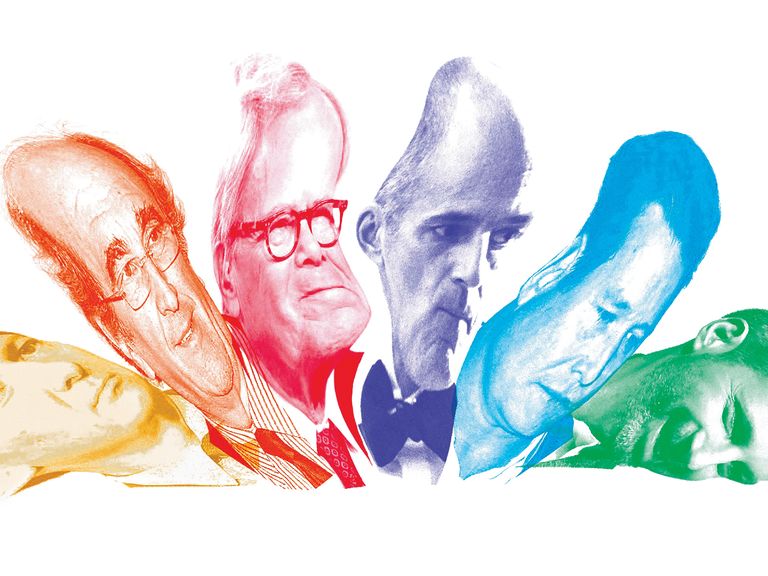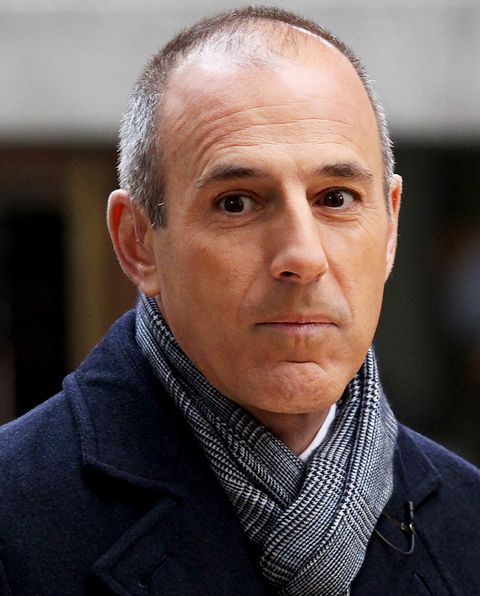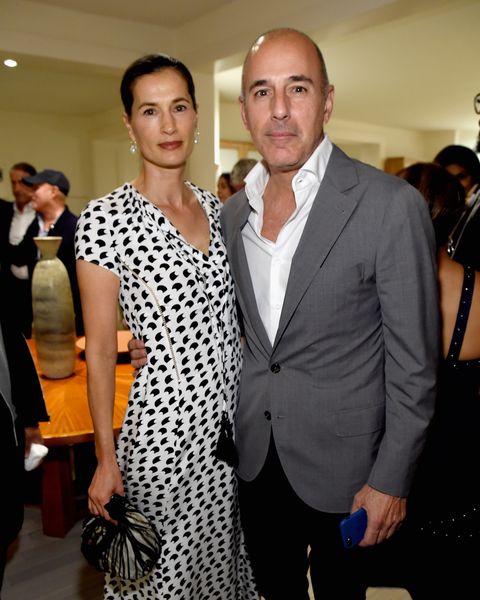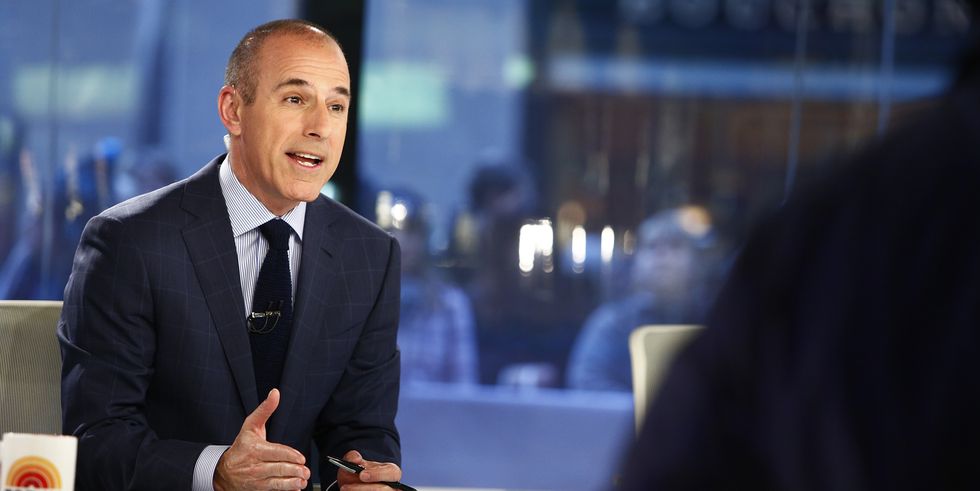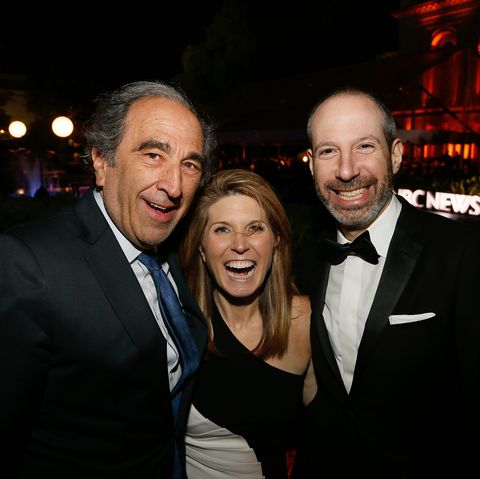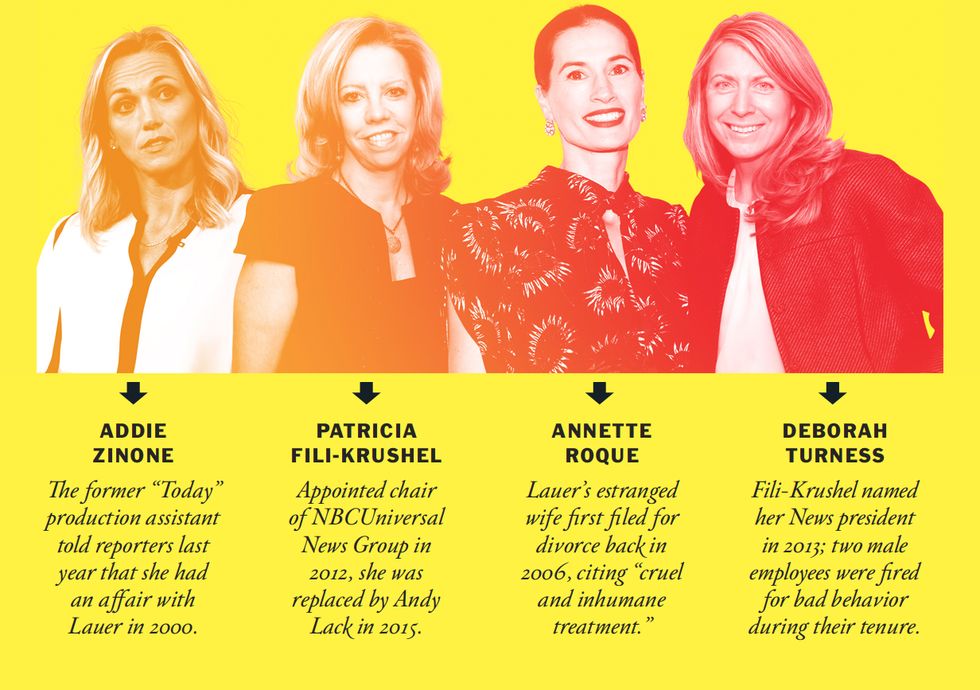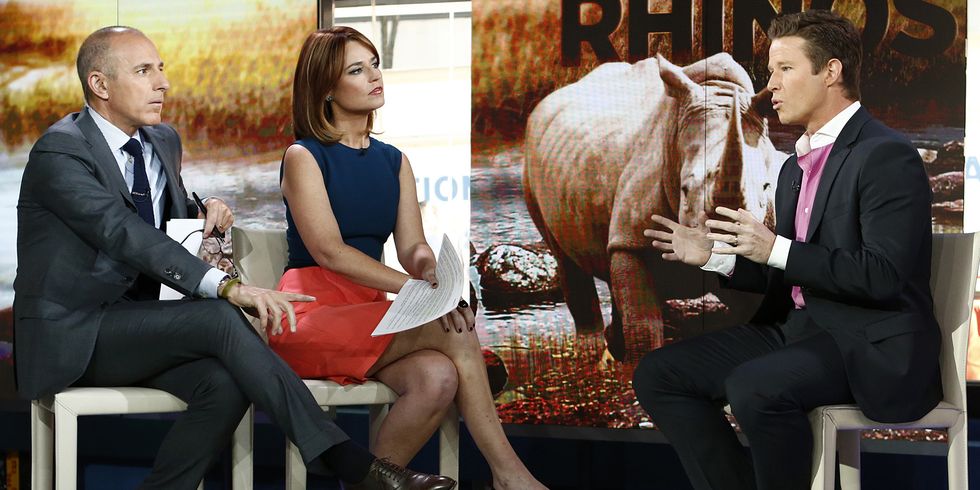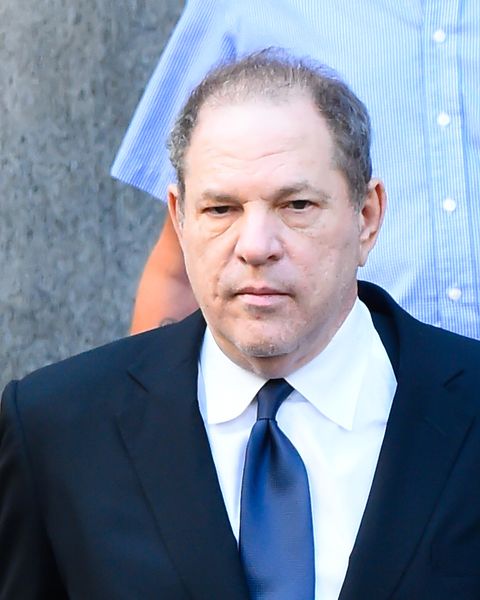It was a little before dawn on the last Wednesday in November, and the robin-egg blue of the slowly brightening sky heralded a fine day—good news for NBC as it prepared for the evening’s Christmas- tree-lighting special, hosted again by then- fifty-nine-year-old Today anchor Matt Lauer, at Rockefeller Center, the network’s home. Yet as the crews for that morning’s broadcast filed sleepily into Studio 1A, where Today is shot, rumors had begun circulating. Lauer hadn’t been to hair and makeup. He wasn’t in his dressing room. His car hadn’t shown. Where in the world was he?
Only a select few were in the know. Savannah Guthrie, who’d cohosted Today since 2012, received a call while en route to the studio. Hoda Kotb’s phone had rung earlier. She’d be cohosting with Guthrie from the top of the show that day instead of starting at her usual ten o’clock hour. The digital clocks around Studio 1A read 06:45—fifteen minutes until airtime—when executive producer Don Nash, whose youthful mien belied his almost three decades at the network, gathered everyone around. (Weeks later, in a post-Lauer purge, Nash would be ousted and replaced by Libby Leist, reportedly a favorite of Guthrie’s.) In shock himself, Nash simply read a statement that was to be released minutes later to the press in the name of Andy Lack, chairman of NBC News.
NBC had received a complaint from a colleague about “inappropriate sexual behavior in the workplace by Matt Lauer,” it began, going on to say that the network had “reason to believe this may not have been an isolated incident.” Then the bomb drop: “We’ve decided to terminate his employment.”
Everyone behind Studio 1A’s glass windows was aghast. A few wept. Were they really cutting Lauer loose?
He had been the breakfast company of millions for two decades, a trusted public persona, and the marquee draw for a franchise that earned the network hundreds of millions per year. He was the face of the Olympics and the Macy’s Thanksgiving Day Parade, “the hunk next door” with a reported salary of $20 million a year, an apartment on the Upper East Side, and three properties on Long Island (a $36.5 million compound in North Haven, a house in Sag Harbor, and a forty-acre horse farm in Water Mill)—not to mention access to chartered helicopters to whisk him from his various homes to 30 Rock and back. Last year, he purchased the lease on a sixteen-thousand- acre ranch in New Zealand. He attended all the right social events and knew all the right people. On top of that, he was widely seen as an entirely professional coworker, always ready with a kind word. And now he was out.
Barely thirty-six hours earlier, the colleague in question (who remains anonymous) had arrived at NBC headquarters to meet with the network’s human-resources and legal departments. She was accompanied by Ari Wilkenfeld, a famously determined civil- rights lawyer with Wilkenfeld, Herendeen & Atkinson in Washington, D. C. Lauer had drawn her into an improper sexual relationship, she alleged. The details were kept quiet, though they were relayed by necessity to the top brass who’d have to decide Lauer’s fate, including Lack.
It had already been a rough year for the network. The previous September, Lauer had received near-universal criticism for his interviews with Hillary Clinton and Donald Trump. (The New York Times called them a “farce.”) In early October 2016, a tape was discovered in the archives of Access Hollywood, part of the NBC family, that had then-candidate Trump boasting about using his celebrity to take advantage of women. Its existence was eventually reported not by NBC but by The Washington Post. Then in October 2017, MSNBC’s Mark Halperin, a fixture on the Sunday talk shows, was fired for sexual misconduct.
On Tuesday, November 28—his last day on the job—Lauer had been on set as usual. Among the topics discussed: the engagement of Prince Harry and Meghan Markle and preparations for the tree lighting. Later that day, HR and Legal confronted him: Were the allegations true? Lauer admitted that he’d had sexual relations with the complainant and nothing more. But that was enough. It fell to Lack, up to that point a close friend, to go to Lauer’s eleven-room Lenox Hill apartment that same evening to tell him not to come to work the next morning, or ever again. He would be denied the $30 million reportedly remaining on his contract.
NBC was constrained from divulging any confidential elements of the first complainant’s story in public. That put the network in a bind. How to justify its treatment of Lauer to staff members without offering evidence? In the end, Lack reportedly would offer one clarifying nugget as he briefed shocked senior Today staffers in the hours after Lauer’s firing: The liaison had begun at the Sochi Winter Olympics in Russia in 2014.
“NBC has a duty to maintain confidentiality,” Wilkenfeld said in an interview on Today two weeks later, “and they have not done a good job of doing that. They know exactly what they’ve done, and they need to stop.”
Lauer retreated to his home in the Hamptons while his wife, Annette Roque, who is filing for divorce, left for Denmark. His exile was swift and stunning—another embarrassment for NBC.
One midsummer morning in 2000, Lauer used Today’s internal-messaging system to get the attention of a production assistant twenty years his junior named Addie Zinone. “I hope you won’t drag me to personnel for saying this,” he wrote. “But you look fantastic.”
Zinone, who’d been a star athlete at Temple University in Philadelphia, was soon to leave Today to become a newsreader at a West Virginia affiliate. Her last gig for Today was to be the 2000 Democratic National Convention in Los Angeles, a few weeks away. Not long after getting the first message, she received a second. “OK . . . NOW YOU’RE KILLING ME,” it started, in capital letters. “YOU LOOK GREAT TODAY! A BIT TOUGH TO CONCENTRATE.”
The telegenic anchors of the post-Cronkite era were rock stars of the broadcast world, and many acted like it. When Nightline’s Ted Koppel gave a eulogy for former ABC News anchor Peter Jennings in 2005, he touched, albeit coyly, on his late colleague’s prowess in the “bedroom department.” “Peter was famously, at times notoriously, attractive to women,” Koppel told the twenty-two hundred mourners at Carnegie Hall. “Even so, he only married four of them.”
Lauer, who paid his dues on local TV before being tapped as a Today guest host in 1993, had also earned something of a reputation. “Women were throwing themselves at his feet,” notes a senior source at the network who counts himself among those still willing to defend him, although not publicly, as someone unfairly sacrificed on the altar of #MeToo. “He was Matt Lauer—he was a star.” Rumors of his extramarital affairs with other stars, among them NBC’s own Natalie Morales, would periodically appear in the gossip columns. (These rumors have been strenuously denied by both Lauer and Morales.)
And there were whispers about his marriage to Roque, a Dutch-born former model. After being set up on a blind date, the couple had married in Bridgehampton in 1998, ten years after Lauer’s first marriage, to Nancy Alspaugh, had ended in divorce. In 2006, Roque filed divorce papers accusing him of “extremely controlling” behavior and “cruel and inhumane treatment,” but subsequently withdrew them.
“This is Matt-freaking-Lauer. Right?” says Zinone, now a forty-two-year-old mother of two who lives in California. “At the height of his success. He can do no wrong.”
Lauer had booked a quiet table at Palio, a now-defunct Italian power-lunch spot in midtown Manhattan, in July 2000, and Zinone agreed to join him.
“You became such friends with everybody else but not with me,” she recalls him saying, referring to Today costars Ann Curry, Al Roker, and Katie Couric. “And it gets into ‘Oh, I’m such an old guy.’ He turned it on so that I would sort of be like, ‘Oh, Matt, come on, you know that’s not true.’
“I was like perfect prey,” Zinone says.
Within minutes of their return to company headquarters, Lauer messaged again, pleading with her to rendezvous in a room over Studio 1A. By then fully aware of what he was up to, Zinone hesitated. She replied, mentioning Lauer’s wife. But he insisted; a car would be arriving for him imminently. “A nervous wreck,” she assented, and the two began what would turn into a weeks-long affair.
On another occasion, he summoned her to his office, even though his assistant sat just outside. “He pushed the button to shut the door. And then I was like, ‘Matt, [she] is out there’. . . but it’s like it didn’t matter. I mean, nothing happened. He tried. But I was like, ‘Oh, no. No. No.’. . . Like, ‘Are you kidding? There are people right outside.’ ” (It is now well established that the button at his desk was a common feature in NBC’s offices enabling all executives and top talent to swing doors shut but not lock them, as some early news reports alleged. The devices were installed by GE when it owned NBC.)
As planned, Zinone left for West Virginia and a career that would alternate between TV anchoring and military service, including two tours in Iraq.
Soon after the affair began, and again in 2006, just after Lauer had been served with divorce papers, tabloid reporters approached her with questions about the Today host. More than once, she says, she was offered money to speak. In 2006, Zinone asked if Lauer had a private email they could use to communicate rather than his NBCUniversal address.
“Nope, this is it,” Zinone remembers him saying. “What’s up?”
“I was like, ‘Wow.’ It just shows that over a period of time, from my perspective, he either felt entitled or never felt like he was going to be called out or face consequences for it.”
In 2009, she returned to her alma mater, Temple, to be inducted into its journalism hall of fame for her work in Iraq as part of the Army’s media unit. Lauer was there to receive a media-excellence award. They exchanged hellos and made awkward small talk.
More straggly on top than he used to be, his famously luxuriant eyebrows now tinged with gray, Andy Lack was surely struggling with déjà vu when in March 2015 he found himself riding the elevators at 30 Rock once again. In 1993, he’d been hired as president of news to right the ship at Dateline following a scandal involving pickup trucks rigged with explosives for a segment about GM vehicles catching fire. Now, after a decade at Sony and Bloomberg, he was back—this time with the grander title of chairman of NBC News—to manage another crisis.
A month before Lack’s rehiring—and just three years after the bungled firing and tearful farewell of Curry, Meredith Vieira’s Today successor—Nightly News anchor Brian Williams was suspended for making up details about his reporting trips. Lack gave the anchor job to Lester Holt in June and parked Williams at MSNBC, with opportunities to return to the main network on special news days. Holt has proved to be a credit to the network, and Williams has attracted no further controversy. Lack’s next big move—spending $69 million to hire Megyn Kelly away from Fox News—did not pay off so well. After much initial fanfare, Kelly’s Sunday-night magazine show has nearly fizzled into oblivion, and ratings for the nine o’clock hour of Today, which she now presides over, haven’t been much better. Nothing, however, has tarnished Lack’s reputation, or that of NBC, more than the events of the past year. Most of us learned of Lauer’s fate from Guthrie and Kotb, who had no choice but to begin that Wednesday broadcast with an explanation of his absence. Among the first to react was President Donald Trump. “Wow, Matt Lauer was just fired from NBC for ‘inappropriate sexual behavior in the workplace,’ ” he tweeted. “But when will the top executives at NBC & Comcast be fired for putting out so much Fake News. Check out Andy Lack’s past!” NBCNews.com dutifully reported the president’s tweet, but it excised those last five words. (Precisely what Trump was insinuating remains unclear.)
The scandal broke just under two months after Harvey Weinstein had been exposed, and many more heads would roll in the coming weeks. Damage control was everything. One of the first steps the company took was to sever all ties with Lauer and scrub from its websites any promotional materials featuring the former Today host. “That was all they cared about,” one source who’s still on the digital team recalls. “No one for one second thought to ask us how we were doing.”
In a new statement, NBC insisted “unequivocally” that “current NBC News management” had known nothing about Lauer’s violations until that Monday. In truth, sources at the network say they had been hearing rumors for more than a month. A few weeks earlier, three news outlets, including Variety, had begun looking into Lauer’s behavior. In one instance, an NBC employee found a Post-it note from a National Enquirer reporter on the front door of their home.
“Matt was confronted by several of us directly, on different occasions,” one senior NBC source confirms. “We sat down with him, looked him in the eye, and said, ‘Is there anything you can think of that even you don’t consider to be harassment that might fall into this category?’ And every one of those times he said there’s nothing. On a couple of those occasions, he said, ‘I’ve been racking my brain.’ Those were his words.”
So it seems they weren’t quite blindsided. But what about all the years prior? “People know,” says journalist and media critic Ken Auletta, who has covered the network for more than twenty-five years. “People [inside the network] know a lot more than people outside do and gossip a lot more and resent a lot more (a) because they think it’s wrong or (b) because they’re jealous or (c) because how the fuck is this guy getting away with it?” Zinone is also sure people at the network knew. Years ago, when she was still in Iraq, a colleague at Today proposed doing a segment on her. A producer, she says, not only nixed the idea but also bad-mouthed Zinone for no apparent reason. They “had to have known something,” she says. “Why not just say, ‘Nah, that’s not a story I’m interested in’?”
Many of the same NBC executives who’d professed shock at Lauer’s behavior were at a private Friars Club roast for the anchor at a Manhattan hotel in 2008. Also in attendance was Trump, then the host of Celebrity Apprentice. The proceedings were recorded by a reporter from The Village Voice. One after another, speakers delivered a fusillade of sexually charged innuendos. Couric rehearsed a David Letterman–style Top Ten list; number two referenced a sex act between Lauer and Curry. Jeff Zucker, then chief of NBCUniversal, spoke of Lauer’s nights on an office couch because of marital troubles at home. Joe Scarborough, cohost of Morning Joe on MSNBC, commented on the night’s events on-air not long after Lauer’s firing. “The whole theme was that he does the show and then he has sex with people, with employees,” Scarborough said. “So was this whispered behind closed doors? No. It was shouted from the mountaintops and everybody laughed about it.”
What’s more, in a 2012 appearance on Andy Cohen’s Watch What Happens Live, Couric was asked about Lauer’s most annoying habit in the years she worked alongside him. “He pinches me on the ass a lot,” she replied. Days after his termination, a video snippet surfaced that apparently showed a moment during a Today commercial break in October 2006 when Lauer seemingly made a crude comment about Vieira. “Keep bending over like that. It’s a nice view,” he was heard to say.
Sources at the network say that NBC News had long operated as a kind of boys’ club in which such peccadilloes and intraoffice flings were swept under the rug. In recent years, however, that had started to change, prompted by the 2012 appointment of Patricia Fili-Krushel as the chair of NBCUniversal News Group. Fili-Krushel in turn appointed Deborah Turness as the first female news- division president. During their tenure—both left 30 Rock by early 2017—two senior male news employees were shown the door for bad behavior, an in-house mini-drama that has not been previously reported.
But it also seems true that Today operated within NBC News as a change-resistant clique that looked down on its less profitable division cousins, even Nightly News. “It is a staggeringly locked-in culture,” notes one former staff member. At its center was Lauer, who routinely dismissed suggested tweaks to the Today formula, even in the post-Curry years, when the show slipped to number two behind ABC’s Good Morning America. “It is a little bit of a Greek tragedy,” the same person comments. “He just became so powerful, everything got sucked into that vortex.”
But once the allegations against him emerged, suddenly it was no longer about him; it was about the network. “While the anchor is a godlike figure, the most important thing is keeping the good name of the network,” Auletta says. “When Andy Lack fired Matt Lauer, he didn’t just fire him because he was outraged by his behavior. He fired him to protect NBC.”
Two days after Lauer’s dismissal, it was reported that NBCUniversal CEO Steve Burke had appointed the company’s own legal counsel, Kim Harris, to lead a review of what had happened, a decision that struck some observers as suspect. “Anyone who was afraid to talk before the investigation is not likely to speak up when attorneys from inside their company try to interview them,” the accuser’s lawyer, Wilkenfeld, told Esquire. “Almost always in scandals of this kind there’s not just one bad actor,” notes Mark Feldstein, a broadcast correspondent for twenty years (two of them at NBC) who now teaches journalism at the University of Maryland. “There is some systemic rot.”
The felling of Halperin and then Lauer emboldened more women to step forward and share long-hidden secrets, including Zinone, who opened up to Megyn Kelly a week before Christmas. “I had no idea there were others,” she says. “I was like, ‘Oh my gosh, I wasn’t the only one. I wasn’t the only one who caved. I wasn’t the only one who fell under that spell.’ ” Early this year, she cofounded a group called Press Forward; it aims both to encourage victims to tell their stories and to help draft new guidelines for protecting and nurturing women in the media workplace.
Jessica Steyers, who was at NBC Sports on and off from 2004 to 2010 as a researcher, writer, and producer and helped cover four Olympic Games, also spoke of constant harassment by coworkers that was never addressed. Steyers says she reported the behavior, but “the overall sense was that nobody wanted to do anything.” Then there was the lewd comment from a producer who saw her kneeling on the ground talking to someone at a national gymnastics championship in Houston: “When you’re finished on your knees, can you please come over to me next?” (NBC Sports is its own unit with its own management, separate from NBC News.)
Steyers’s story came via UltraViolet, a women’s-rights group that posted ads on LinkedIn and other online platforms asking NBC employees to volunteer personal stories of harassment or abuse. She and two other women I spoke to on the condition of anonymity said they were neither surprised by the Lauer scandal when it broke nor hopeful that actions taken since, including the internal review, would bring about meaningful change. Some also reflected on the network’s questionable handling of big stories about powerful men intimidating or abusing women. After NBC neglected to report on the Access Hollywood tape for four whole days, the story, arguably the most important of the election, leaked to The Washington Post, which turned it around in just five hours.
The delay may have had to do with shielding the other man on the tape, Billy Bush, who only shortly before had become a Today host. “NBC News had [the tape],” says the senior source at the network, who thought others at NBC found the tape “damaging to Billy” and “didn’t want to take down their own guy. They got hammered for that.” Bush was, in the event, fired. For its part, the network has said it took time to legally vet the story and decide where it should air. That’s plausible. But at the very least, this seems to say something about the network’s sense of urgency. “I felt that over the years the journalism was getting softer and softer,” notes a recently departed employee who worked at NBC News for more than a decade. “If you wanted something serious on-air, you were constantly embattled.”
In the minds of many, the Trump-tape fiasco later became conflated with the network’s handling, in 2017, of the Harvey Weinstein affair—in particular the decisions to allow the journalist Ronan Farrow to take his months-long investigation into Weinstein elsewhere, and then to ignore it in the first hours after the scandal broke in The New York Times.
“I think it’s all of a piece,” Feldstein says. “All of this put together suggests a really troubling culture when it comes to truth, which is what a news organization values above all else. Truth in owning up to sexual misconduct. Truth in reporting what it knows about. All of this shakes the public credibility of NBC News as an independent journalistic institution.”
NBC still struggles to justify its decision last summer to take a pass on the material Farrow had on Weinstein by suggesting it fell short journalistically. “We reached a point where he believed his story was ready for broadcast. At that time, he did not have a single victim or witness to misconduct by Harvey Weinstein that was willing to be identified, not one,” a senior source at NBC says. NBC News president Noah Oppenheim, who’d returned to NBC from Hollywood—he wrote the screenplay for Jackie, the 2016 biopic about Jacqueline Kennedy—reportedly made the same case at a staff meeting a day after Farrow implied on MSNBC’s The Rachel Maddow Show that the network had caved to outside pressure.
Even if Farrow did have more work to do, as NBC maintains, why abandon all the investment already made and allow a competing news organization to benefit? Although he was a contractor, Farrow was working with full-time NBC employees and had spent eight months on the story. “I still don’t understand why they didn’t run it,” says Auletta, who helped connect him with The New Yorker. (Farrow won a Pulitzer prize for the story.)
“This story has revealed so much about the evil of men,” Farrow said while accepting a 2017 Vital Voices Solidarity Award in December. “The crimes, the abuse of power, the men who preyed upon the vulnerable, the men who maintained a veil of silence around that predation.” Now he has a book in the works, provisionally titled Catch and Kill, a phrase previously associated with David Pecker’s National Enquirer. It promises to offer a starkly different version of Farrow’s experiences at the network, including a dismissal of the notion that their parting of ways was amicable, an idea that NBC still clings to. “Nobody here thought that there was any bad blood,” the senior source at NBC says. “And when he broke the story, we were all proud of him.”
Farrow is likely to challenge NBC’s assertions regarding the progress he had or hadn’t made—for example, he had audio of Weinstein admitting to sexual assault on a tape recorded by the NYPD. A source involved at the time says the network canceled interviews out from under Farrow—one with a Weinstein victim ready to talk for the first time—and ordered the producers working with him not to take any more calls on the story.
On October 5, the day The New York Times published its first bombshell scoop on Weinstein, naming Ashley Judd as a victim in the lead, NBC was the only network not to even mention it on its evening news broadcast. Even the next day, while its rival morning shows pored over the fast-breaking scandal, Today referred to it only briefly in the run of the news digest. A segment was planned for that morning, according to the senior source at the network, but it never aired.
Producers of both Nightly News and Today strongly deny that the network actively interfered in their decisions. “It is patently false to say we were ordered to kill or ignore the story,” says Janelle Rodriguez, senior vice-president of editorial in charge of Nightly News. Similarly adamant were Libby Leist and her coexecutive producer at Today, Tom Mazzarelli. “We were never told how to cover the Weinstein story. Any suggestion otherwise is totally false,” they say in a joint statement NBCUniversal provided to Esquire. “NBC News has run 158 stories on or mentions of Weinstein since the news first broke,” Rodriguez says, adding that “NBC News pursued, booked, and aired the first television interview with a Weinstein victim within three (business) days of the Weinstein story breaking in the Times.” Yet none of that explains why the network, unlike its competitors, failed to fully cover the scandal in the hours after it broke.
The NBCUniversal review was finally released in May. The seven-page report noted that “within two weeks” of Lauer’s firing, the company received information about “three additional women” who’d been inappropriately approached by him dating back to 2000, 2001, and 2007, respectively. Yet it exonerated management, insisting no one in NBC News leadership had received “any complaints about Lauer’s workplace behavior prior to November 27.” (The report did note that Lauer “could be flirtatious . . . and would openly engage in sexually oriented banter in the workplace,” which “may have contributed to an atmosphere where some employees who may have had concerns assumed nothing would be done to address them.”) Lack simultaneously sent a “Dear colleagues” memo to employees, lamenting that the “last few months have been extraordinarily difficult.” Once again, the network’s explanation was met with skepticism.
“What Matt Lauer was able to do does not happen as a one-off; this happens as the result of a culture and a pattern of protecting stars and making them untouchable,” says Karin Roland, UltraViolet’s campaigns chief. “An internal investigation of NBC investigating themselves, their own management, and work culture is a sham, a classic case of a fox guarding a henhouse. It needs an external, not internal, investigation. They need to investigate not just Lauer but the management and the culture that allowed that to continue.” Days before the report was released, Tom Brokaw found himself accused by a former NBC correspondent, Linda Vester, of making unwanted advances on her in the 1990s. Though different in degree, the allegations, published by The Washington Post and Variety, nevertheless threatened the reputation of the network’s mascot of journalistic gravitas. In an email to friends that became public, Brokaw suggested that Vester had had a mediocre career, was being “melodramatic,” and “had trouble with the truth.” He’d been the victim of a “drive-by shooting” and implied that he had been used by Vester to advance her career. (He said he’d helped her land a job at Fox.)
A letter in defense of Brokaw quickly surfaced, signed by more than one hundred women, both formerly and currently at NBC. It did not originate inside the network, but it did circulate on the newsroom floor. NBC reporters who might have had reason to cover the Brokaw story were required to make reference to the letter.
When advertisers gathered at Radio City Music Hall this past spring for a preview of NBC’s fall season, the network’s own Seth Meyers told the crowd, “It’s not surprising for NBC to be dramatic—we are home to the number-one drama on television. A show that each week gives us twists and turns, heartbreaking reveals, and this season the departure of a once-beloved character. I’m talking, of course, of ‘This is the Today show.’”
After being rehired by NBC News to reclaim some of its luster, Lack has achieved something close to the opposite. He has presided over one public-relations disaster after another while ABC News has continued to nip at the heels of both Today and Nightly News, frequently overtaking them in the ratings. Whether Lack and his team, including Oppenheim, can persuade Comcast CEO Brian Roberts to give them more time to set things right remains one of the most closely watched decisions in the industry. The tabloids periodically fizz with speculation of a Lauer comeback, if not at NBC, then somewhere else, possibly a cable-news channel. But that is unlikely, at least for now. “Could he come back in three years?” Auletta asks. “Maybe. America’s a surpris- ingly forgiving country and loves comeback stories.”
Lauer remains secluded at the beach. He has been negotiating with his soon-to-be ex-wife’s divorce lawyers and attempting to offload properties—his Sag Harbor home has been listed for $12.75 million, and his Upper East Side pad sold for a reported $7 million in April. (He was also spotted driving a Land Rover with a “For Sale” sign in the window.)
Lauer has broken his silence on only three occasions, each time conceding that he’d erred but simultaneously downplaying his misdeeds. “I fully acknowledge that I acted inappropriately as a husband, father, and principal at NBC,” he said in a statement in April, before adding that “any allegations or reports of coercive, aggressive, or abusive actions on my part, at any time, are absolutely false.” After NBC released the results of its review in May, he put out another statement, saying, “There are aspects of the NBC report with which I clearly disagree.”
Every now and again, he gets snapped by the paparazzi, carrying pizza to his car or sitting astride a brand-new Harley-Davidson. In those pictures, he looks much like the old Matt Lauer we all used to know so well. Or rather the Matt Lauer we didn’t.
This article appears in the September '18 issue of Esquire. Subscribe Today
